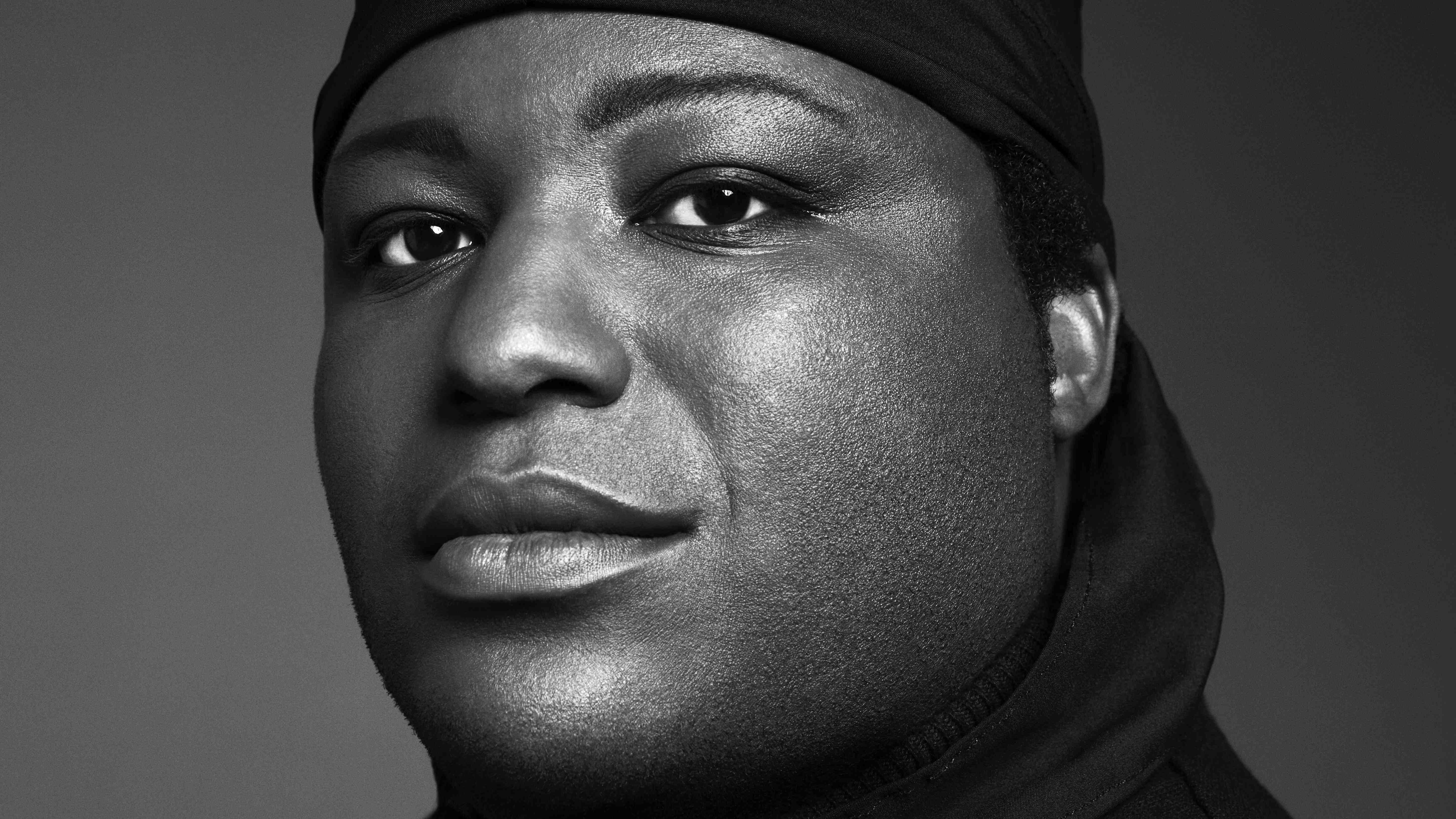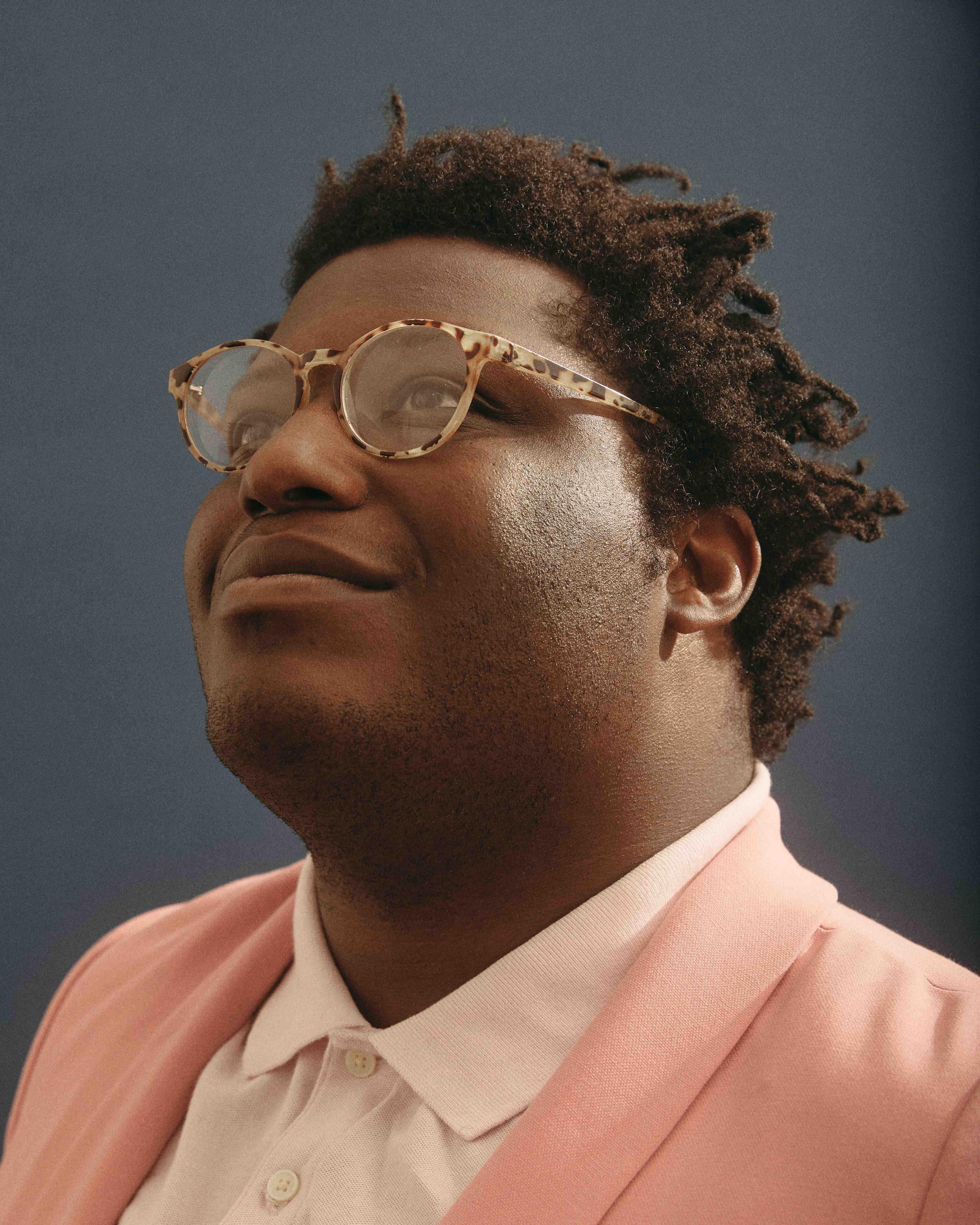
Larry Owens Is Unapologetically Theatrical on Stage, on Screen, and Over Zoom
From Broadway to your browser, Larry Owens brings bold, unapologetic theatricality to every performance
By Blair ThompsonJune 11 2025, Published 1:00 p.m. ET

When I logged onto Zoom to interview Abbott Elementary guest star Larry Owens, I was greeted not with a live image but with a striking photo of Broadway legend Patti LuPone. It was the perfect (and hilarious) omen for what was to come—a conversation steeped in drama, depth, and a little unpredictability.
Owens, a multi-hyphenate performer with Broadway roots, a Writers Guild Award to his name, and a growing presence in TV and film is known for delivering performances that are as emotionally layered as they are fearless. He’s a magnetic presence on screen, with sharp wit and a deep theatricality that pulses through each role, whether in an intimate indie short or a guest-starring moment on one of TV’s hottest comedies.
But during our conversation, things got unexpectedly tense. At one point, Owens asked me point blank whether I had seen his short film The Gag, part of the Indeed Rising Voices program—an initiative from Indeed in collaboration with Lena Waithe’s Hillman Grad Productions and 271 Films. The program aims to discover, invest in, and amplify stories from Black, Indigenous, and People of Color (BIPOC) filmmakers. Grounded in the belief that talent is universal but opportunity is not, Rising Voices helps bridge that gap by providing emerging creatives with the resources and platform to tell culturally resonant stories on their own terms.
I had seen it and came prepared with questions about its layered satire and cultural commentary, but I’ll admit, the moment rattled me. When I asked him what his biggest surprise or learning moment was while directing the film, he flipped the question back on me: “What was your biggest surprise or learning moment watching the film?” I, too, was “gagged”—floored, stunned, caught off guard, as the slang goes. It was a reminder that for artists like Owens, whose work is deeply personal and specific, surface-level conversation isn’t enough. He demands—and deserves—thoughtful engagement.
The Gag, which Owens wrote, directed, and scored, centers on a host who misuses their platform—a sharp commentary on visibility, ego, and responsibility. The film is unapologetically theatrical, layered with references that will hit differently depending on who’s watching, and that’s the point. There’s a kind of punk honesty in Owens’ filmmaking, a refusal to dilute the weirdness or soften the satire. It’s part Broadway, part Black Mirror—a reflection of Owens’ stage background and his fearless voice as a storyteller. The Patti LuPone Zoom avatar he used during our interview wasn’t just a nod—it was a statement. Like much of Owens’ work, The Gag draws from theatrical traditions to interrogate modern life.
“The idea came to me because I’ve been talking a lot about the new modes of communication—the cell phone, the internet, social media,” Owens explained. “We really do live in a 24/7 infosphere. And so The Gag is about a talk show host who uses that attention for the wrong
thing. I’m always interested in a human moral story, and I was able to tell that in a fun way, not just with music, but also through an anti-hero.”
That anti-hero, Deanie Myers, serves as both a cautionary tale and a chaotic spectacle.
“By looking at the anti-hero protagonist, Deanie Myers, we sort of have a what-not-to-do,” he said. “How can we use our platforms for good? How can we treat the people who we work with equitably and with respect? And how can that have a positive effect on ourselves, which is the opposite of what happens to Deanie. She treats everyone like shit. She goes after the sweet girl on air, and then she has to deal with those consequences.”
Even with its surreal tone, the film lands emotionally—thanks to that balance of spectacle and sincerity.
“In telling a nuanced and balanced story … it becomes a part of real life, even though it has elements of surrealism,” Owens said.
That same commitment to complexity shows up in Owens’ work on Abbott Elementary, where he brings heart, humor, and a deep understanding of character to the role of Zach. His appearances on the Emmy-winning series may be brief, but they’re memorable—part of a larger pattern in Owens’ career of scene-stealing moments that still serve the ensemble.
“It’s really amazing to be a part of something that reaches so many people, especially people who look like me and come from the communities that I come from and also aspire to create art on the level of the show,” he said. “There’s the community of people who enjoy the show, and there’s also the community of people who make the show. And I feel equally a part of those two communities, and it’s an honor to represent all of those people.”
That sense of connection extends beyond what’s seen on screen. Owens was especially energized by the opportunities Abbott creates behind the camera.
“One of the things that excites me is that writers of the show—like Brittani Nichols, who’s written some of the amazing arcs for the character of Zach—are also now directing on that show,” Owens said. “There is really an open channel of growth inside of the microcosm of that show that I know will bleed out into the macrocosm of the whole industry. So I’m just really excited to work with Black writers, Black actors, Black directors, Black EPs—all of which we have on that show—and all of which I feel like is represented in the work that Hillman Grad Productions and Indeed’s Rising Voices is doing with platforming creators of color.”
That spirit of representation and opportunity is also reflected in Owens’ personal inspirations, particularly the Black women reshaping theater and storytelling. “I’m really inspired by a ton of Black women who are working in a theatrical space,” he said, pointing to artists like LaChanze, a Tony-winning actress and producer who recently directed Wine in the Wilderness by Alice Childress. “She’s been really instrumental in making sure that the legacy of Alice Childress is preserved,” he added, noting that Childress was the first Black female playwright to have a play produced in New York City, even before A Raisin in the Sun's Lorraine Hansberry.
Owens also highlighted LaTanya Richardson Jackson, who is currently starring on Broadway in Purpose, a play that began at the Steppenwolf Theatre Company, where Owens studied ensemble theater alongside his teacher, Alana Arenas. And then there’s Olivia Washington, who inspired Owens to write his first play, Five Sisters. “Now, all three women are involved in the life of that play,” he said. “I’m just so in awe.”
As our conversation wound down, Owens spoke of faith, not in a vague, abstract sense, but as a guiding principle that grounds his artistry and fuels his vision. “Faith is the substance of things hoped for and the evidence of things not seen,” he said, quoting Scripture. “So I’m hoping we use our good taste to prolong the life of artisans because they reflect our humanity back to us.”
For Owens, faith is not just spiritual—it’s tangible. It lives in the evidence: in being a Black, queer protagonist of size on national stages and screens, in a Pulitzer Prize-winning musical, in one of TV’s most-watched comedies, and in a short film greenlit through the Rising Voices program. “Before that greenlight comes a screenplay, comes a concept, comes an application. So it’s both the hope, and it’s also the faith,” he said. “And it’s also the evidence.”
That moment brought our earlier conversation full circle. When I asked Owens about his biggest surprise or learning moment directing The Gag, he turned the question around on me: “What was your biggest surprise or learning moment watching the film?”
I told him the truth. My Best Friend’s Wedding is one of my favorite movies, partly because Julia Roberts plays an anti-hero: flawed, self-serving, yet still deeply human, and that tension makes the story more complex and emotionally satisfying. The Gag gave me that same kind of layered feeling. Deanie Myers isn’t likable—she’s a cautionary tale, a spectacle, a mirror. But that’s what made the film so compelling. It made me uncomfortable, challenging me to ask myself what I would do with a platform, how I treat people when I think no one is watching, and whether I truly value equity over ego.
Like Owens, I believe intentional, personal art can reflect something essential—not perfection, but truth. And when it really works, it doesn’t just entertain us. It asks us to look inward and maybe, if we’re willing, to grow.

